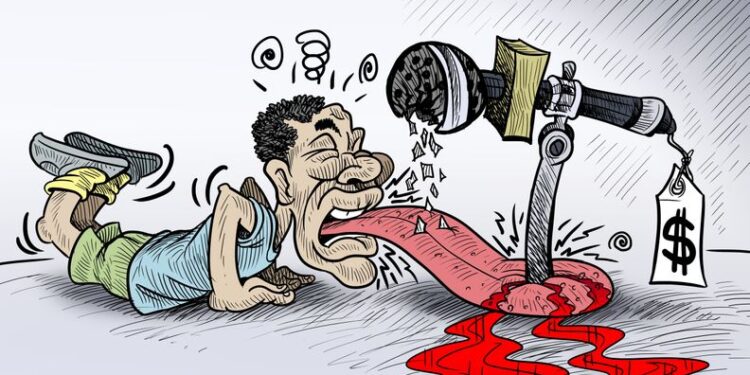For generations, editorial cartoons have been poking fun at those in power and holding them accountable for their actions. Kings, dictators, and other authority figures are often the target of these caricatures, reminding everyone that no one is above reproach or criticism.
This tradition is believed to have started with court jesters in medieval Europe when people would poke fun at kings without fear of being beheaded. Cartoons have since become popular political commentary, allowing people to express their views.
Today, editorial cartoons can be found in newspapers, magazines, and online. They often take the form of clever visual metaphors or puns that make a point about current events or politics. In a world where people are increasingly divided along political lines, cartoons can provide a space for dialogue and understanding.
This is the mission Nestory Fedeliko, one of Tanzania’s prominent editorial cartoonists, has adopted. His work strives to draw attention to important issues and bring people together.
Primarily known as FeDe, Nestory started drawing professionally in 2009. He has published many cartoons in several newspapers, including Kenya’s Daily Nation newspaper (Monday edition) and The People; Tanzania’s Raia Mwema, Raia Tanzania, Tanzania Daima, Mtanzania, and Bingwa; and VOA Swahili (Voice of America — Swahili) online edition.
FeDe has also illustrated many schoolbooks in Tanzania and Kenya. Still, he has a knack for creating thought-provoking images that educate, create awareness of critical issues, find solutions to those issues, and entertain.
Speaking to Journalists For Justice, FeDe had a lot to say on how cartoons can advocate human rights, challenge people’s perspectives, and provide an outlet for meaningful dialogue so that society can collectively find solutions to its shared problems.
“Our community faces many challenges and issues regarding justice and human rights, and with a commitment to be a voice for the voiceless, I took up editorial cartooning to bring light to these issues in thought-provoking, entertaining, and potentially life-changing ways,” said FeDe.
His motivation for drawing cartoons for social change springs from his desire to create something that can make a difference in people’s lives. He believes that editorial cartoons can be used to reject social norms and challenge existing stereotypes. With a history of being a powerful form of expression, FeDe’s drawings allow him to air his views while advocating justice and human rights. This is all too important given the significance of the role of human rights in society.
“Justice and human rights are crucial to the development of society. Without them, our community can’t work effectively. We can’t get an education, and good health, or enjoy freedom of speech. My cartoons remind people of the importance of these critical issues, and I want my cartoons to be a catalyst for change and a platform for dialogue to create a more just and equitable society,” notes FeDe.
The artist gets ideas for his cartoons both from global events and happenings in his community, especially those he considers need to be discussed or require urgent solutions.
It’s no easy task blending humour with serious messages. Although it is easy to leverage people’s love for humour to create editorial cartoons that appeal to their emotions, FeDe says art isn’t without its fair share of challenges.
“The most challenging cartoons are those that attack a person or an institution directly, especially in politics. We live in a diverse society with different views and opinions. I have to ensure that my cartoons don’t cause offence or hurt anyone’s feelings. Although I haven’t faced big challenges, I’d say that the hardest part about my work is ensuring that my cartoons are accurate, fair, and respectful.”
Despite these efforts, cartoonists often receive criticism and threats, to which the artists must respond positively and remain level-headed. As FeDe puts it, “respond to criticism positively, be confident, and careful all the time.”
Challenges aside, FeDe has had some memorable responses to his work. Recalling when he first started drawing political cartoons, he says he has never felt more proud than when some of his “fans” visited his office to congratulate him on his excellent work. That sense of pride is what motivates his commitment to bringing about social change and helping people to gain insight into an issue.
FeDe’s most memorable cartoon is the one depicting the leader of Uganda oppressing the opposition while speaking to the media, saying his opponents are safe and that there is no bad blood between them.

The cartoon sparked many discussions and conversations, especially on social networks, regarding the plight of the opposition in Uganda. It was published in a newspaper in Tanzania and on VOA-Swahili.
FeDe acknowledges that he still has a long way to go in editorial cartooning and his resolve to call out injustices, and he advises aspiring cartoonists to constantly research and always understand their communities’ problems. They can then develop a good approach to creating awareness and how to solve the problems.
“Be patient, resilient, and consistent in your work. Don’t be discouraged by criticism or setbacks; use this as an opportunity to grow and expand your career. Also, network with other cartoonists and like-minded activists to exchange ideas and collaborate. That way, you can learn from each other and significantly impact social change,” FeDe cautions.
He also urges cartoonists to use their work to draw attention to social justice and human rights issues.
“A cartoon can spread the message easier than word of mouth. It can also act as an educational tool. By creating a dialogue between the cartoonist and the audience, people can see different perspectives of an issue or better understand it.”







